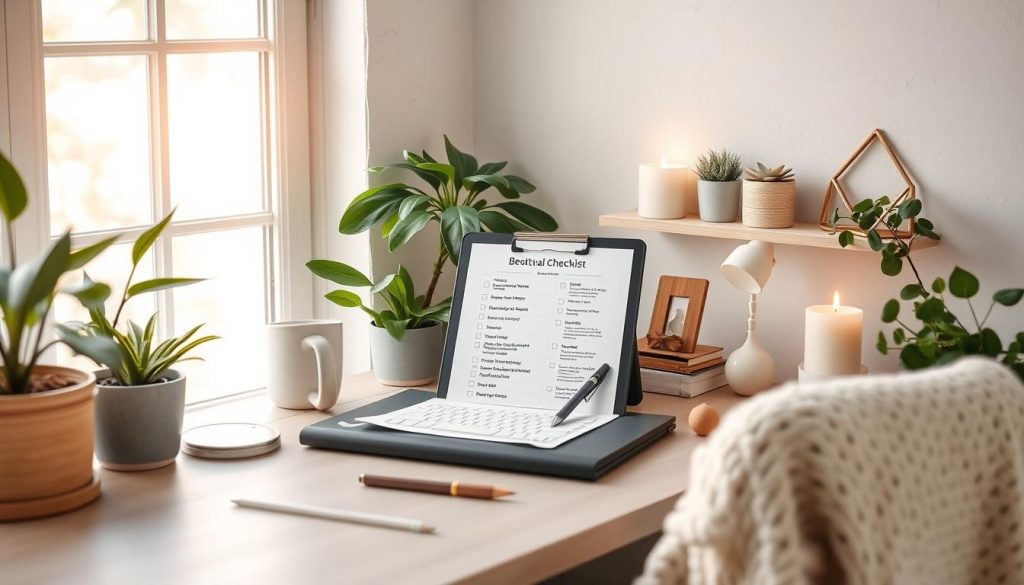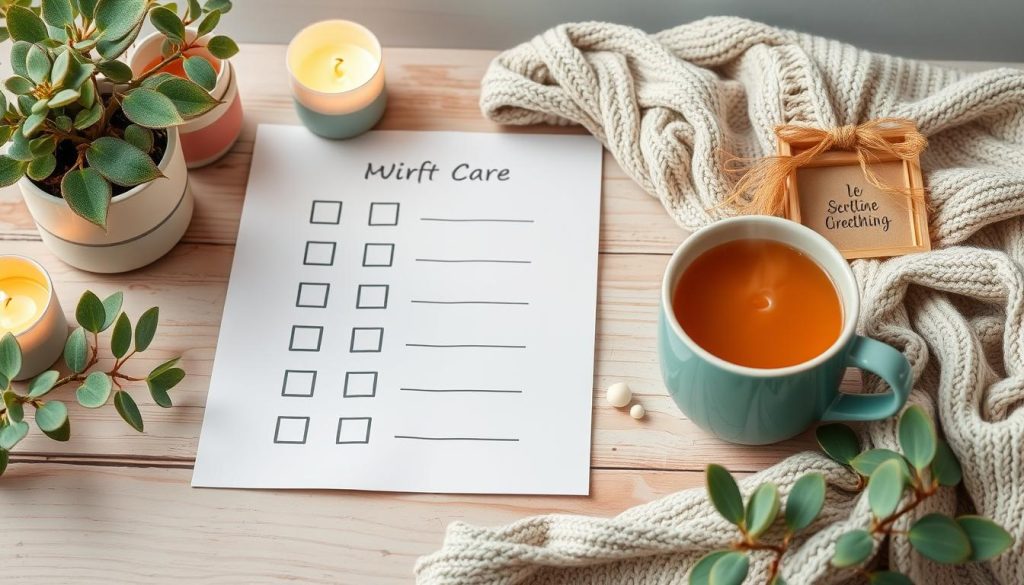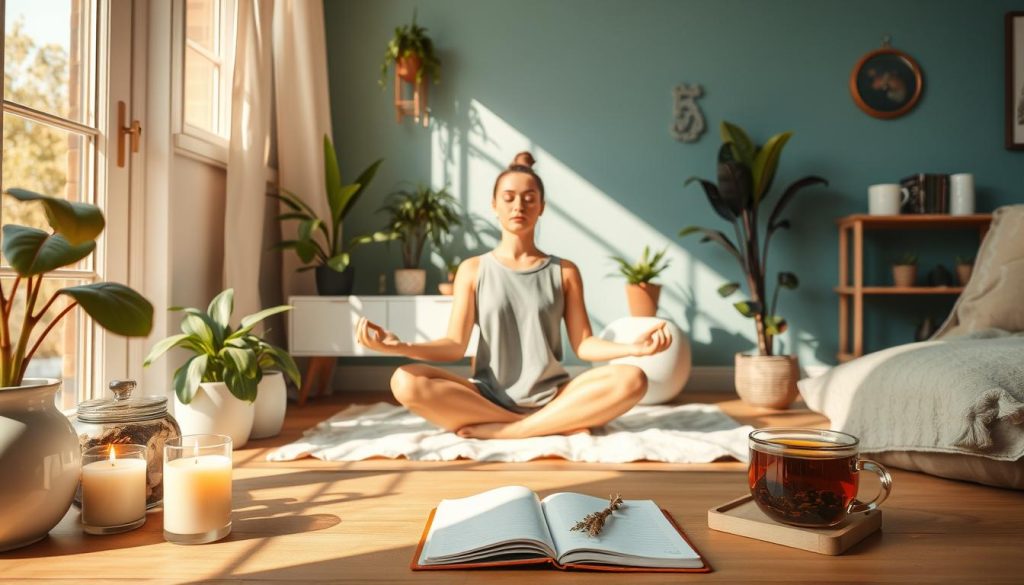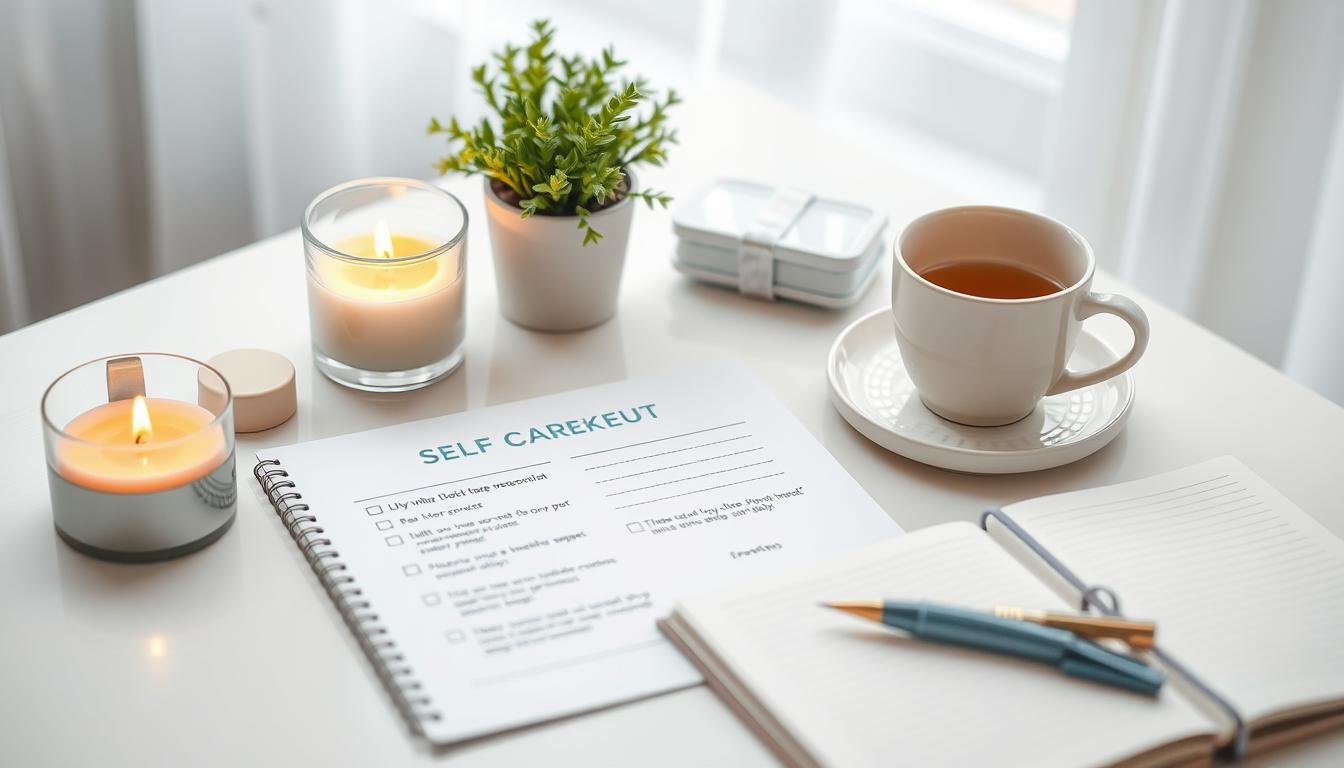Essential Self-care Checklist for Mental Health
In today’s fast world, self-care is key for our mental health. This checklist guides me through simple self-care steps for daily life. It shows how self-care boosts our emotional and social health, especially when things get tough.
Did you know 86% of people eat well often, but 69% don’t play for fun? This shows we need better habits. Simple acts like 10 minutes of meditation or 7-9 hours of sleep help a lot. Being in nature also lowers stress and brings calm, linking our surroundings to our mental health.
The Importance of Self-Care for Mental Health
Understanding self-care is key for good mental health. Doing self-care regularly is not just a treat; it builds emotional strength and mental balance. A recent survey showed that 71% of people felt happier after adding self-care to their daily lives.
When I make time for self-care, I see big benefits. For example, I get 67% more productive. The same survey found that 64% of people felt more confident in themselves. These gains are important for better mental health.
Creating a self-care checklist helps a lot. It has 75 items to fit my needs. Focusing on five key self-care activities a day is easy and works well. I take a few minutes each day to see what I need to focus on. This keeps my self-care effective and relevant.

Adding simple self-care steps like deep breathing, enough sleep, or journaling helps a lot. The World Health Organization says self-care covers many areas, including nutrition and mental health. By knowing what I need, I can build a strong base for my mental health. This ensures I meet my personal needs and preferences.
Understanding Mental Health and Well-Being
Mental health is more than just not being sick. It’s about how I feel, think, and act every day. Taking care of my mental health is key to feeling good. Spotting symptoms and getting help is the first step to managing my mental health.
Being mentally healthy makes my relationships better. It helps me feel like I belong and have self-worth. Being around people who support me makes me feel better. Plus, exercising boosts my mood and self-confidence.

Learning new things boosts my confidence and helps me connect with others. Doing good for others makes me feel happy and fulfilled. Mindfulness helps me enjoy life more and understand myself better.
The World Health Organization says self-care is important for mental health. It includes eating well, staying clean, and living a healthy lifestyle. A checklist helps me remember to meditate, socialize, and exercise regularly.
Regular self-care makes me happier and less stressed. It’s a daily commitment to positive thinking, staying hydrated, and enjoying life. This keeps my mental health strong.
What is a Self-Care Checklist?
A self-care checklist is a personal guide for better mental health. It lists activities that help me care for myself. This way, I can reflect on my habits and make changes.
By making a self-care checklist, I focus on what I need. It can include simple daily tasks or more complex routines. This helps everyone find something they can do. Studies show that 68% of workers feel overwhelmed without self-care.
In my checklist, I include activities for my body and mind. For example, spending time outside makes 65% of people feel refreshed. Keeping a balance helps me stay on track with my mental health.

Having a self-care checklist keeps me consistent and makes small changes easier. Only 45% of workers exercise three times a week, so physical health is key. It also encourages mindfulness, which 80% of employees don’t prioritize. Following my checklist helps me set better boundaries and improve my well-being.
Self-care Checklist for Mental Health
A self-care checklist for mental health includes activities that boost physical and mental well-being. It’s important to prioritize self-care for a better life. I organize these activities into physical and psychological self-care. This ensures I take care of both my body and mind.
Physical Self-Care Activities
Physical self-care is key to my daily routine. Regular exercise improves my mood and sleep. Here are some activities I do:
- Brushing and maintaining my hair.
- Setting aside time for my preferred exercise routines.
- Preparing nutritious meals that fuel my body.
- Staying hydrated to support cognitive function.
These activities help me care for my body, which is essential for my mental health.
Psychological Self-Care Activities
Psychological self-care is vital for managing stress and boosting emotional strength. I use several techniques to improve my mental state:
- Engaging in mindfulness meditation to center my thoughts.
- Journaling daily to process my emotions and reflect on my experiences.
- Scheduling regular therapy appointments for professional guidance.
- Participating in support groups to connect with others facing similar challenges.
These activities help me deal with stress and build a sense of community. They are crucial for my mental health.

Incorporating Self-Care into Daily Life
Adding self-care to my daily routine is key for my mental health. Today’s fast pace makes it hard to focus on self-care. To make self-care a priority, I schedule it like any other important task.
Setting reminders and making “me time” helps me stick to it. This way, I make sure to take care of myself every day.

Self-care boosts my emotional strength and helps reduce stress. I tailor my self-care plan to fit my life and needs. Activities like yoga, meditation, or a relaxing bath make me happy and help me feel in control.
Keeping track of my self-care journey is important. I note which activities work best for me and adjust my routine as needed. This way, I do what’s best for my well-being.
Starting with small habits helps me get ready for bigger changes. This approach turns self-care into a positive cycle. It brings me peace and improves my overall well-being.
Benefits of Regular Self-Care Practices
Regular self-care brings many benefits that improve my life quality. It boosts emotional resilience, making daily challenges easier. I feel less anxious and stressed, handling situations calmly.

Self-care increases self-awareness and self-compassion. A self-care routine, including emotional, physical, and social aspects, strengthens relationships. Simple tasks like making my bed or exercising boost my mental health.
Mindful practices like meditation or yoga are life-changing. They reduce stress and improve sleep. Taking care of my physical health with healthy food and exercise boosts my emotional strength. Moving and connecting with nature lifts my mood and well-being.
Consistent self-care benefits many areas of my life. It nurtures my mental and physical health, leading to a positive mindset. This motivates me to keep these habits, making my life richer.
Creating a Personalized Self-Care Plan
Making a self-care plan starts with understanding your current habits. This is key to knowing what you do well and what needs work. By looking at how you fit self-care into your day, you can find what stresses you out and what makes you tired. Then, you can pick self-care strategies that really fit your life and what you like.
Assessing Current Self-Care Habits
Thinking about your self-care habits regularly can really help your well-being. For example, you might think about:
- Physical activity: The CDC says you should exercise for 150 minutes a week. This can really improve your health.
- Sleep: Trying to get 7-9 hours of sleep each night can make you feel clearer and more emotionally strong.
- Emotional health: Doing things that make you feel good and thinking about your feelings can keep your mind stable.
- Stress management: Recognizing when you’re stressed is important. Using things like mindfulness and positive thoughts can help you stay calm.
When you look at your habits, using a Self-Care Assessment can help you see what you’re doing right and what might be off. This is a crucial step in making a self-care plan that’s just for you. It lets you do things that help you stay balanced and grow.
Next, doing things like journaling and making a Self-Care Worksheet can help you find new self-care activities. Sticking with this journey helps you put your self-care plan into action. It also lets you keep track of how you’re doing and make changes as needed.
Physical Self-Care: Nurturing Your Body
In my journey toward better mental health, I’ve learned how crucial physical self-care is. Taking care of my body through various practices has greatly improved my well-being. Sadly, only 33% of Americans get the recommended 7-9 hours of sleep each night, as the CDC reports. Getting enough sleep is key to both physical and mental health.
Being active is also important in my daily routine. Studies show that walking for 30 minutes a day can boost mood and health, as the National Institute of Mental Health found. This small effort can make a big difference, showing how physical self-care affects my mental state.
I’ve also started meditating regularly. This simple act can help reduce anxiety and keep my mind healthy. Whether it’s short breathing exercises or longer meditation sessions, these moments are crucial for my physical and mental balance.
Keeping track of my self-care activities is essential. Platforms like Evidation help me monitor my mood and body care, earning points for my mental health. This accountability keeps me focused on taking care of my body.
- Focus on quality sleep.
- Incorporate daily walks.
- Maintain a regular meditation practice.
- Track mood and self-care activities.
By making these physical self-care habits a part of my life, I’ve built a strong foundation. This foundation supports both my physical and mental health.
Psychological Self-Care: Supporting Your Mind
Supporting my mind through psychological self-care is key for emotional strength and better well-being. Thoughtful activities help me deal with feelings and build healthier habits and relationships. Here are some emotional self-care activities that help me care for my mental health.
Activities for Emotional Self-Care
- Practicing mindfulness through meditation keeps me grounded and lowers stress a lot.
- Journaling lets me share my thoughts and feelings, leading to a better understanding of myself.
- Connecting with loved ones through open talks about my emotions builds strong support.
- Setting boundaries helps me manage my emotional energy and have healthier relationships.
- Positive self-talk changes my thoughts, making me more optimistic.
- Participating in creative outlets is a great way to express myself and find new ways to be creative.
- Seeking professional support when needed adds extra mental health help during hard times.
Spiritual and Meaningful Self-Care
Engaging in spiritual self-care is key to my emotional health. It helps me connect with myself and the world around me. Activities like meditation and self-reflection help me understand my beliefs and values.
Being in nature is a great way to relax and boost my mood. Studies show it can reduce anxiety and depression. I often take time to be thankful for the people and connections in my life.
Reflecting on my spiritual path helps me find purpose and joy. Journaling helps me understand my thoughts and feelings better. It also gives me the energy to tackle challenges head-on.
By focusing on what matters most to me, I become stronger and more balanced. This approach helps me manage stress and improve my overall well-being.
Building Healthy Relationships for Better Mental Health
Healthy relationships are key to my mental health. I spend time with friends and family, knowing they offer vital support. Sharing moments and feelings makes our bonds stronger and communication better.
To keep these relationships healthy, I set clear boundaries. This helps protect my feelings and lets me connect with others. Setting these boundaries helps us respect and understand each other, which is crucial for emotional balance.
Feeling connected makes me stronger against stress. I practice gratitude, which highlights the importance of my relationships. This practice boosts my mental health by showing me the support I have.
- I make sure to regularly talk to my friends and family to keep our connections strong.
- Doing fun activities together, like exercising or trying new hobbies, brings us closer.
- Being willing to listen and share is key to good communication.
As I grow these healthy relationships, my mental and emotional health improves. The support from my network helps me face life’s challenges. It makes my life more fulfilling and happy.
Overcoming Obstacles to Practicing Self-Care
It’s key to face and tackle the hurdles to self-care for my mental health. I often struggle with not having enough time, feeling guilty for focusing on myself, and thinking self-care is selfish. These issues make it tough to do things that help me feel better, especially since many people feel guilty when they take time for themselves.
To beat these self-care barriers, I aim for achievable goals and remember that small steps can make a big difference. Doing things I enjoy, practicing mindfulness, and exercising can greatly improve my life. These activities release happy chemicals in my brain, making me feel better emotionally.
Also, getting support from friends or experts helps me stick to self-care. Having people who understand and support me makes it easier to overcome these challenges. By taking care of myself first, I can better care for others. This shows that overcoming self-care obstacles not only benefits me but also those around me.






